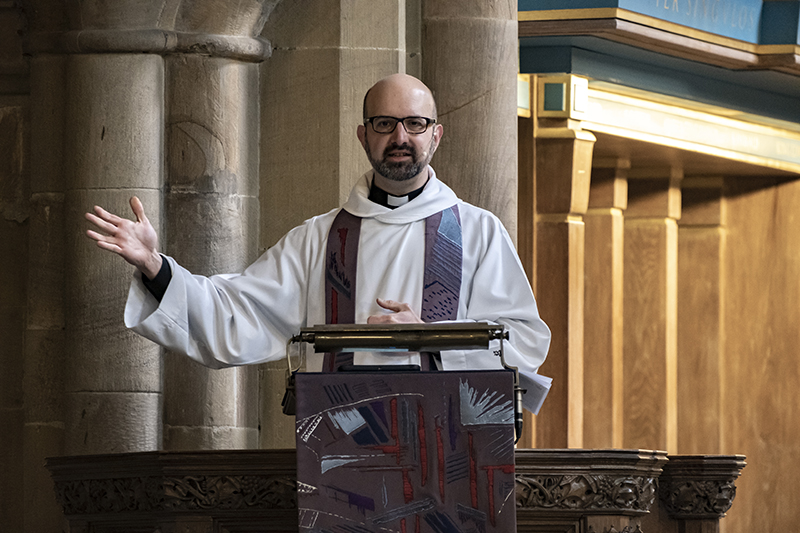Preached by the Revd Pete Gunstone.
Lent 2, Year A
Genesis 12.1-4
John 3.1-17
Genesis 12 is the key text for unlocking the narrative of the Old Testament. It is the fulcrum between the story of “the families of the earth” and the story of “the great nation” of Israel. It sets up Israel’s relationship with God, later to be revealed as Yahweh, and begins to defines the way in which that relationship will be enacted.
Yet, on a more personal level, it recounts the simple yet significant call of one person to leave their life behind and follow God for the sake of a promise offered.
Today, each one of us gathered here at the cathedral either in the building or online is invited to hear the same call as that posed to Abraham:
Go
- from the familiar to the unfamiliar
- from what you see to what I will show you
- from what you know to what I know
- from a place in which you define the limits to a more spacious place
It is a call
- To follow God to become something beyond yourself
- To receive blessing so that you may bless others
- To become the chosen of God so that others might also become chosen
I wonder if that is a call that you have heard for yourself in the words of Jesus, “come, and follow me”? For some of us, perhaps this is a call that we have recently accepted, and we are experiencing the newness and sometimes scariness of exploring the new space that is faith in and life with Jesus. Perhaps this is a call that we accepted some time ago and we are walking with Jesus and growing in faith. Or perhaps this is a call that feels distant or detached from us, for whatever reason.
2000 plus years on from the call of Abram, enter Nicodemus, one of the leaders of the ancient people of Israel, that nation called to follow the call of God to become a blessing to the whole world. But, as the narrative of the Old Testament and our own life experience makes plain, following the call of God is not without its challenges. As say every day at morning prayer, the words of Zechariah in his Benedictus set out plainly that we are in need being freed to worship and serve God without fear
In holiness and righteousness before him :
all the days of our life (BCP).
For Nicodemus and his fellow Pharisees – a term which means, ‘the separated ones’ – their way of dealing with the problem of sin was through obedience to the written law through adherence to additional oral teachings. This was their understanding of what it meant to follow God, to become a great nation, to live in God’s blessings, and they were ardent evangelists in order to share the blessing of their way of life with others.
But they weren’t the only God-show in time. Into the panoply of religious entered a general workman from Nazareth.
[I have to admit that, at this point in my sermon preparation, I reached for Google, half-expecting that Bradford might have its own Nazareth somewhere, given that Egypt and Jericho are just over the hill from Thornton!]
Enter Jesus, declared by John the Baptist to be the Lamb of God who takes away the sin of the world. Enter someone who, in contrast to the disciplined, scholarly Pharisees, is creating something of a stir with his penetrating insight and party-raising miracles. Enter Jesus Christ, the Eternal Word made flesh, living amongst us, God as one of us.
Just as they had been with John, with his wild words and wilderness baptisms, the Pharisees were curious. But this time, they’re really, really curious. Whilst before they merely sent some “priests and Levites” from Jerusalem to ask John “Who are you”, this time one of their leaders goes himself to Jesus – albeit under the cover of darkness, which is either irrelevant or ironic when you’re visiting the Light of the World. Nicodemus is respectful, but he’s clearly not yet seen who Jesus is, and that’s nothing to do with the lack of electric light in first century Palestine. His term of greeting, “Rabbi”, meaning “my great one”, is that of a disciple to a teacher. He recognises that there is something of the presence of God going on here, but he doesn’t recognise that he is actually now in the very presence of God, speaking with the very one who wrote the law that he’s dedicated his life to studying, let alone the one who moulded and shaped in in his mother’s womb.
Perhaps we are sometimes a bit like that with Jesus. We’ll happily say that Jesus was a great guy, moral example, wise teacher, and even a miracle worker… but will we bow down and worship?
The writer of the Venite, Psalm 95 prompts us:
O come, let us worship, and fall down :
and kneel before the Lord our Maker.
For he is the Lord our God :
and we are the people of his pasture, and the sheep of his hand.
(Psalm 95.6-7, BCP)
And so we get to the crunch point. Jesus says to us today, as much as he says to Nicodemus:
- “no one can see the kingdom of God without being born from above” (v.3)
- “no one can enter the kingdom of God without being born of water and Spirit…what is born of the Spirit is spirit” (vv.5-6)
- “The wind blows where it chooses, and you hear the sound of it, but you do not know where it comes from or where it goes. So it is with everyone who is born of the Spirit.” (v.8)
This is something that God is calling each one of us to, whether we’re stood in this pulpit, sat on a chair in this cathedral or at home on the sofa, we’re out and about jogging around Queensbury and listening to the livestream, or even sat in the stall of the Dean of Bradford. God invites and calls each and every one of us into relationship with him, into the everyday reality of what the bible describes as “eternal life”, by being born from above, born of water and the Spirit, and to live by the Spirit. Just as Jesus addressed this to Nicodemus in his time, so by his Spirit and through my words he is addressing it to each and every one of us here this morning.
If this is something that you’re feeling a nudge about or would like to explore further, please do speak to speak to someone about this – perhaps Andy, Ned or myself, but also perhaps the person that you’re sat next to. It might be that you’re hearing the call of God for the first time in some way; it may be that you’re hearing the call of God to renew your commitment to following him. There are a number of ways of doing this that are upcoming in our worshipping life as a cathedral:
- On Easter Eve, there will be the opportunity for Baptism at the Easter Vigil at 7pm;
- On Sunday, May 21, Bishop Toby will come to anoint with oil and lay hands on all who wish to receive Confirmation of the Holy Spirit in their lives.
Whilst we don’t offer rebaptism or reconfirmation to those who have already been baptised or confirmed, there will be opportunities for the renewal of baptismal vows and a fresh anointing at these services. Please feel confident in coming to speak to Andy, Ned or myself if you would like to explore these opportunities for yourself or someone else.
Let us pray.
For God so loved the world that he gave his only Son, so that everyone who believes in him may not perish but may have eternal life.
Go and become.
Come and follow me.
Be born anew.
The Collect for the Second Sunday of Lent
Almighty God,
you show to those who are in error the light of your truth,
that they may return to the way of righteousness:
grant to all those who are admitted
into the fellowship of Christ’s religion,
that they may reject those things
that are contrary to their profession,
and follow all such things as are agreeable to the same;
through our Lord Jesus Christ,
who is alive and reigns with you,
in the unity of the Holy Spirit,
one God, now and for ever.
Amen.
Genesis 12.1-4a (NRSV)
1 Now the Lord said to Abram, ‘Go from your country and your kindred and your father’s house to the land that I will show you. 2 I will make of you a great nation, and I will bless you, and make your name great, so that you will be a blessing. 3 I will bless those who bless you, and the one who curses you I will curse; and in you all the families of the earth shall be blessed.’ 4 So Abram went, as the Lord had told him; and Lot went with him.
John 3.1-17 (NRSV)
Now there was a Pharisee named Nicodemus, a leader of the Jews.
2 He came to Jesus by night and said to him, ‘Rabbi, we know that you are a teacher who has come from God; for no one can do these signs that you do apart from the presence of God.’
3 Jesus answered him, ‘Very truly, I tell you, no one can see the kingdom of God without being born from above.’
4 Nicodemus said to him, ‘How can anyone be born after having grown old? Can one enter a second time into the mother’s womb and be born?’
5 Jesus answered, ‘Very truly, I tell you, no one can enter the kingdom of God without being born of water and Spirit. 6 What is born of the flesh is flesh, and what is born of the Spirit is spirit. 7 Do not be astonished that I said to you, “You must be born from above.” 8 The wind blows where it chooses, and you hear the sound of it, but you do not know where it comes from or where it goes. So it is with everyone who is born of the Spirit.’
9 Nicodemus said to him, ‘How can these things be?’
10 Jesus answered him, ‘Are you a teacher of Israel, and yet you do not understand these things? 11 ‘Very truly, I tell you, we speak of what we know and testify to what we have seen; yet you do not receive our testimony. 12 If I have told you about earthly things and you do not believe, how can you believe if I tell you about heavenly things? 13 No one has ascended into heaven except the one who descended from heaven, the Son of Man. 14 And just as Moses lifted up the serpent in the wilderness, so must the Son of Man be lifted up, 15 that whoever believes in him may have eternal life. 16 ‘For God so loved the world that he gave his only Son, so that everyone who believes in him may not perish but may have eternal life. 17 ‘Indeed, God did not send the Son into the world to condemn the world, but in order that the world might be saved through him.

